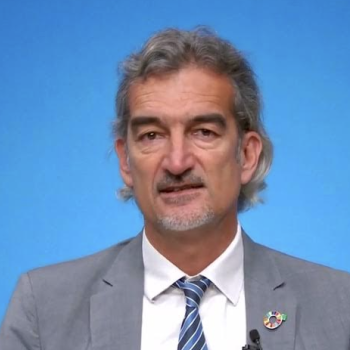Shaping policy and boosting efficiencies in Uruguay
The Resident Coordinator in Uruguay, Pablo Ruiz Hiebra, has spearheaded a number of critical initiatives, including a UN system comprehensive analysis and policy recommendations for Uruguay’s post-Covid-19 recovery, Dialogues for the Future of Uruguay, gender parity panels and common UN premises for a more efficient UN system in the country.
Upon his arrival in country, the Resident Coordintor convened discussions with the local authorities and rallied a joint UN country team effort to support Uruguay’s post-COVID-19 recovery. Following this engagement, the Resident Coordinator presented to the Government a joint strategy paper “Recommendations of the United Nations system in Uruguay regarding post-COVID recovery policies”, which kicked off a series of sectoral dialogues between UN agencies and the Government on a wide range of recovery policies that underpin Uruguay’s process towards the achievement of the Sustainable Development Goals (SDGs).
- In order to complement the programming of the UN Sustainable Development Cooperation Framework (2021-2025), the roadmap agreed with the Government to guide the activities of the UN country team over a 5 year period, the Resident Coordinator generated a multistakeholder space for reflection regarding the main challenges that Uruguay faces to achieve the global goals of the 2030 Agenda and beyond – the Dialogues for the Future of Uruguay. By convening different UN, Government and civil society partners together, these Dialogues provide an important platform to address the issues that require stronger collective action. The two initial dialogues focused on the climate crisis, and the cooperativism for a social economy. A total of twelve sessions are being held between September 2022 and March 2024, to support the country’s path to sustainable development, covering topics ranging from sustainable production; science, technology, and innovation; mental health; parity democracy; violence and security; work, productive transformation and productivity; transforming education; social protection and aging.
- The Resident Coordinator advocated for a pledge on #NoSinMujeres (not without women) and ensured a UN commitment to “no more all male panels”. The Inter-American Development Bank, the Organisation of American States and the World Bank joined the pledge. Government entities, members of the diplomatic corps, private sector companies, and civil society actors have also expressed their commitment to the initiative. Under this push, the UN country team launched a video campaign on the International Day of Democracy to promote gender parity for a ‘parity democracy.'
- In line with the UN reform and with the aim of enhancing coherence, efficiency and effectiveness, the Resident Coordinator has pushed for a joint UN House in Montevideo. The result of this work is “Casa ONU”, located in the old town close to the Government buildings. In In addition to the Office of the Resident Coordinator, Casa ONU now hosts about one third of the UN staff in Uruguay. Additional office space and meeting rooms are available for the use of inter-agency initiatives and the whole UN system in Uruguay.
Watch the video below from the Resident Coordinator to learn more about results in Uruguay.


